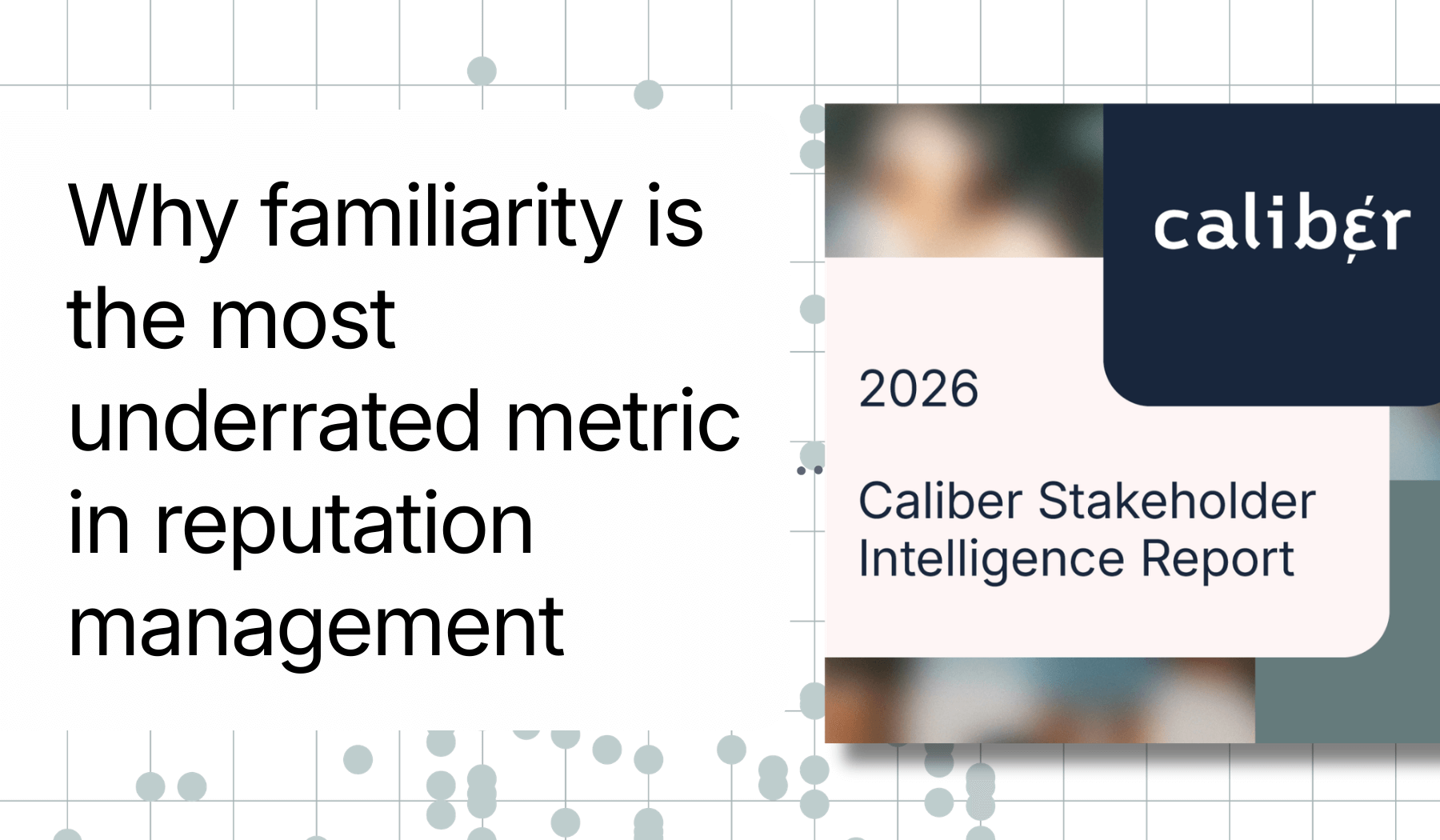

Churches (24%) and small and medium-sized enterprises (21%) are the most trusted institutions in America.
Large corporations (3%) are the least trusted institution, behind Big Tech (4%), Congress (5%) and the White House (10%).

Trust in institutions is divided along party lines: Democrats most trust news outlets, Republicans religious institutions and law enforcement bodies.
Democrats prefer presidential candidates to have political and legal experience.
Republicans prefer candidates to be business leaders and military figures.
Celebrities have little appeal as potential candidates, though Dwayne “The Rock” Johnson has the most cross-party appeal, especially among independent voters.
“Companies can stand out from the crowd and build trust among stakeholders by operating with more responsibility and integrity.”
Shahar Silbershatz, Caliber CEO
Business is widely believed to be more “trusted” than other storied institutions such as governments or NGOs. That’s certainly the conclusion of one prominent annual survey, which hogged headlines again this year with its assertion that “respondents in every country except Saudi Arabia and Singapore said that business was both more competent and more ethical than government and media”.
This topic is very much in our wheelhouse. Our mission is to help companies become more trusted by listening to their stakeholders. Our slogan is “Better business through greater trust.”
Along with likeability, the degree to which a company is trusted is one of the core reputational attributes we track and reflect through a Trust & Like Score.
What, though, does it mean to trust an institution? What is a trusted business? The extent to which it’s perceived as “competent” or “ethical” is one way to assess its apparent trustworthiness. Arguably, however, the extent to which people say they trust it — or trust it to tell the truth — is a more convincing, if not credible, lens.
Moreover, with a sometime CEO and self-styled “businessman” seeking reelection against a former prosecutor and Senator, we also surveyed perceptions of the ideal background and qualities of the commander-in-chief — including those of actual or hypothetical presidential candidates.
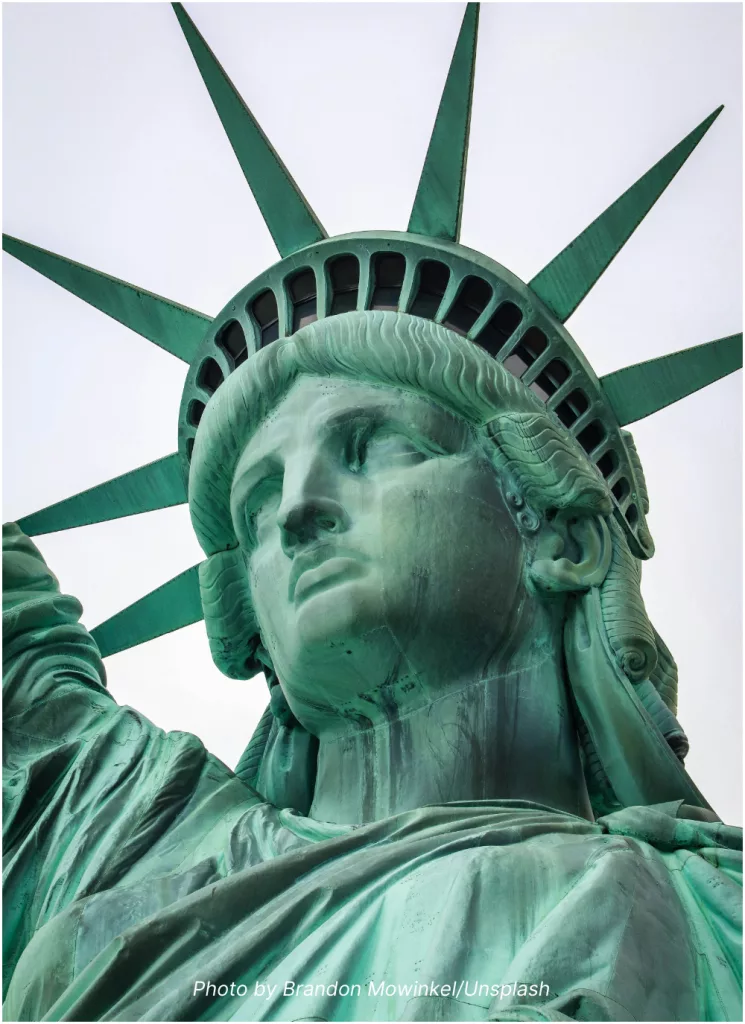
What does our data about trust in institutions show?
First, some businesses are “more trusted” than other institutions. Indeed, “small and medium-sized enterprises” (SMEs) — mom-and-pop stores, local and regional companies, businesses rooted in their communities — are the second-most trusted institutions in the US, pipped to the top spot by churches and other religious bodies.
Second, the data disproves the idea that big business is “more trusted” than other institutions such as the media or government. Quite the opposite. Large corporations are the least trusted institution, behind Big Tech and Congress. In other words, the picture is more nuanced than headlines about trust in business would have us believe.
Size, visibility and authenticity may explain this discrepancy. By definition, SMEs have fewer employees than large corporations. They also have fewer offices, a smaller geographic reach and stronger ties to local communities. SMEs typically have a human face and engage with customers more directly, personally and authentically.
By contrast, large corporations can easily come across as deracinated behemoths spanning countries and continents, located everywhere but nowhere. In popular culture, they are often depicted as pantomime villains — shifty, shady enterprises whose real purpose is always concealed.
Large corporations are also easily associated with entire sectors, and vice versa. This bank is the face of Wall Street. That pharmaceutical giant typifies Big Pharma. By the same token, large corporations are typically viewed as having greater political power and more able than SMEs to lobby for their interests and rest their thumb on the scale.
Little wonder, then, that stakeholders are quick to trust the SME, the multi-generational family-run store doing honest business on the same street corner, but distrust faceless blobs headquartered in Delaware and doing business on every continent.
"The data disproves the idea that big business is “more trusted” than other institutions such as the media or government."
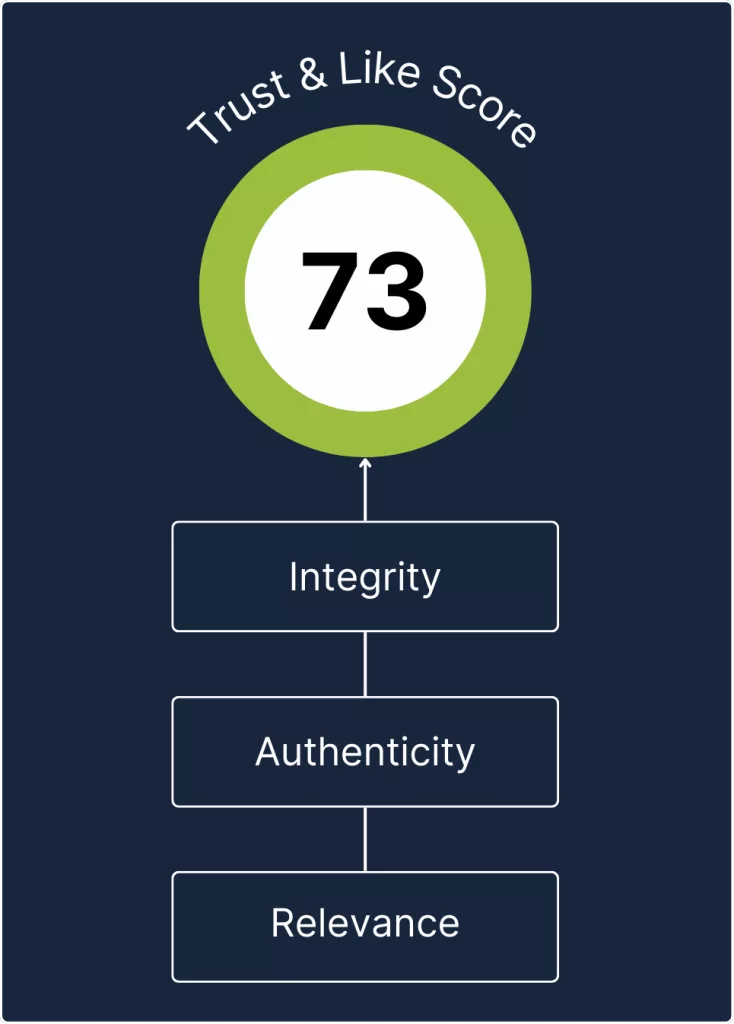
What should we make of all this? Well, it’s bad news for big business as a whole. But for individual companies, it’s an opportunity to stand out, to be the exception that proves the rule.
People may not trust large corporations per se — but as our historical stakeholder-perception data shows, they do trust many companies individually.
Indeed, a glance at any of our sector reports — and the wide range of Trust & Like Scores that companies routinely get — suggests as much.
We continuously track perceptions of thousands of global corporations — and can see, in real time, vast differences in how stakeholders perceive their brand and reputation.
A closer look at our historical data also reveals what any company must do to become more trusted.
The three biggest drivers of corporate reputation are stakeholder perceptions of a company’s Authenticity, its Relevance, and how much Integrity it has — in other words, whether it’s perceived to behave responsibly.
Indeed, our data shows that a company’s Integrity score is responsible for 13.4% of its overall Trust & Like Score.
The upshot? To become more trusted, a company should operate in a more trustworthy manner. And, as our latest data shows, the bigger the company, the more their work is cut out.
"People may not trust large corporations per se — but as our historical stakeholder-perception data shows, they do trust many companies individually."
When asked which institutions they trust most to tell the truth, Americans place the highest trust in churches/organized religion (24%) and small and medium-sized enterprises (SMEs) (21%), followed by the medical system (18%) and the police (17%).
However, trust in institutions is significantly shaped by political affiliation.
Democrats trust newspapers (24%), the medical system (23%), and SMEs (20%). They also place relatively high trust in television news (19%) and the White House (16%).
Republicans, by contrast, place far greater trust in churches (38%) and the police (23%), with SMEs (20%) also ranking highly. Republicans have less trust in newspapers (8%) and the White House (7%), reflecting their broader skepticism towards mainstream media and political institutions.
There’s also a clear distrust of large corporations and Big Tech. Large corporations (3%) and Big Tech companies (4%) rank among the least trusted institutions among those who identify as voters of both parties.
The tables show responses to the question, “Which of the following institutions do you trust the most to tell you the truth?”, among respondents who identify as either Democrats or Republicans.
If we combine similar institutions into broader categories (e.g., combining both “newspapers” and “television news” as “news outlets”), the trust divide is even clearer:
The table shows responses to the question, “Which of the following institutions do you trust the most to tell you the truth?”, among respondents who identify as either Democrats or Republicans.
Our data allows us to compare individuals with a high level of education (those who continued education beyond high school) and those with a middle/low education (high-school graduates and people completing some high-school education, respectively). It reveals some key differences in trust in political institutions and businesses.
Trust in political institutions (including the White House and Congress) is relatively similar between the groups:
A key difference emerges when looking at trust in business per se (i.e., SMEs, Big Tech and large corporations): 28% of highly educated respondents trust business, compared to 17% of the middle/low education group.
It may be that those with higher levels of education are often more familiar with — and integrated into — the business world and have more favorable views of its institutions. By contrast, those with lower levels of education may have less exposure to, or positive experiences with, business environments, leading to less trust.
Another standout finding is the relatively low trust in SMEs among the middle/low education group:
Only 14% of this group trust SMEs, making it the 7th most trusted institution for them.
For comparison, among the highly educated group, SMEs are the second-most trusted institution, at 22%, mirroring the trust levels seen in the general public (21%).
The discrepancy could suggest that while highly educated individuals and the broader public view SMEs as reliable, community-based entities, those with lower levels of education may not see the same level of reliability in smaller businesses, possibly due to different personal experiences or exposure to small business environments.
Trust in institutions is deeply divided along party lines, with Democrats favoring news outlets and Republicans placing their trust in religious institutions and law enforcement.
Highly educated Americans trust in business (SMEs, Big Tech and large corporations) more than others.
Next, we asked Americans about the type of individual best suited to be President of the United States.
Lawyers/judges (29%), Congresspersons (27%), and Soldiers/military leaders (27%) are their top choices, reflecting a strong preference for political and legal experience.
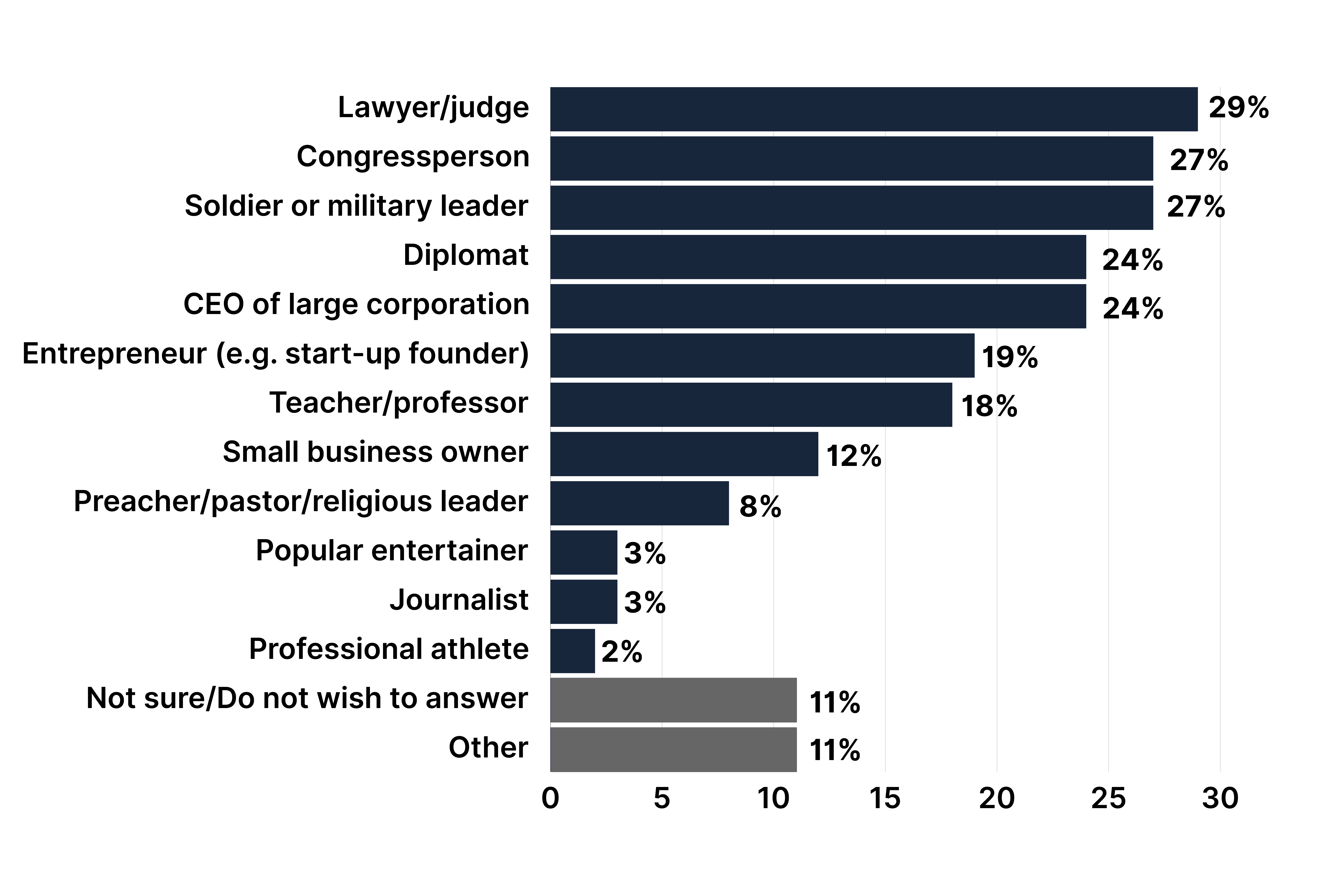
The table shows responses to the question, “Thinking about the most important qualities the President of the United States should possess, what type of individual would be best suited for the presidency?”
However, political leanings once again influence preferences:
The tables show responses to the question, “Thinking about the most important qualities the President of the United States should possess, what type of individual would be best suited for the presidency?”, among respondents who identify as either Democrats or Republicans.
When similar professions are grouped, it’s clear that Democrats favor candidates with a political/legal background (74%), while Republicans prefer those with a business background (63%).
These preferences reflect broader ideological divides, with Democrats valuing political experience and Republicans emphasizing leadership in business and military service.
The tables show responses to the question, “Thinking about the most important qualities the President of the United States should possess, what type of individual would be best suited for the presidency?”, among respondents who identify as either Democrats or Republicans, where similar professions or backgrounds have been combined.
Democrats prefer presidential candidates with political and legal experience, while Republicans lean toward business leaders and military figures.
Across the political spectrum, integrity/honesty (58%) and communication skills/diplomacy (38%) are considered the most important qualities for a president.
These qualities are valued more than ruthlessness/being uncompromising (5%), youthfulness/appearing energetic (4%), and creativity/being innovative (9%).
Democrats (58%) and Republicans (56%) both agree that integrity is the most important quality. However, Democrats place more emphasis on communication skills/diplomacy (40%) and compassion (27%), while Republicans prioritize courage (31%) and business experience (32%).
Political experience is more important to Democrats (34%) than to Republicans (21%), who value Business experience (32%) more.
This suggests that while there is common ground on key leadership qualities, there are notable differences in the emphasis on experience, with Democrats focusing on political and diplomatic skills and Republicans valuing business success and strength.
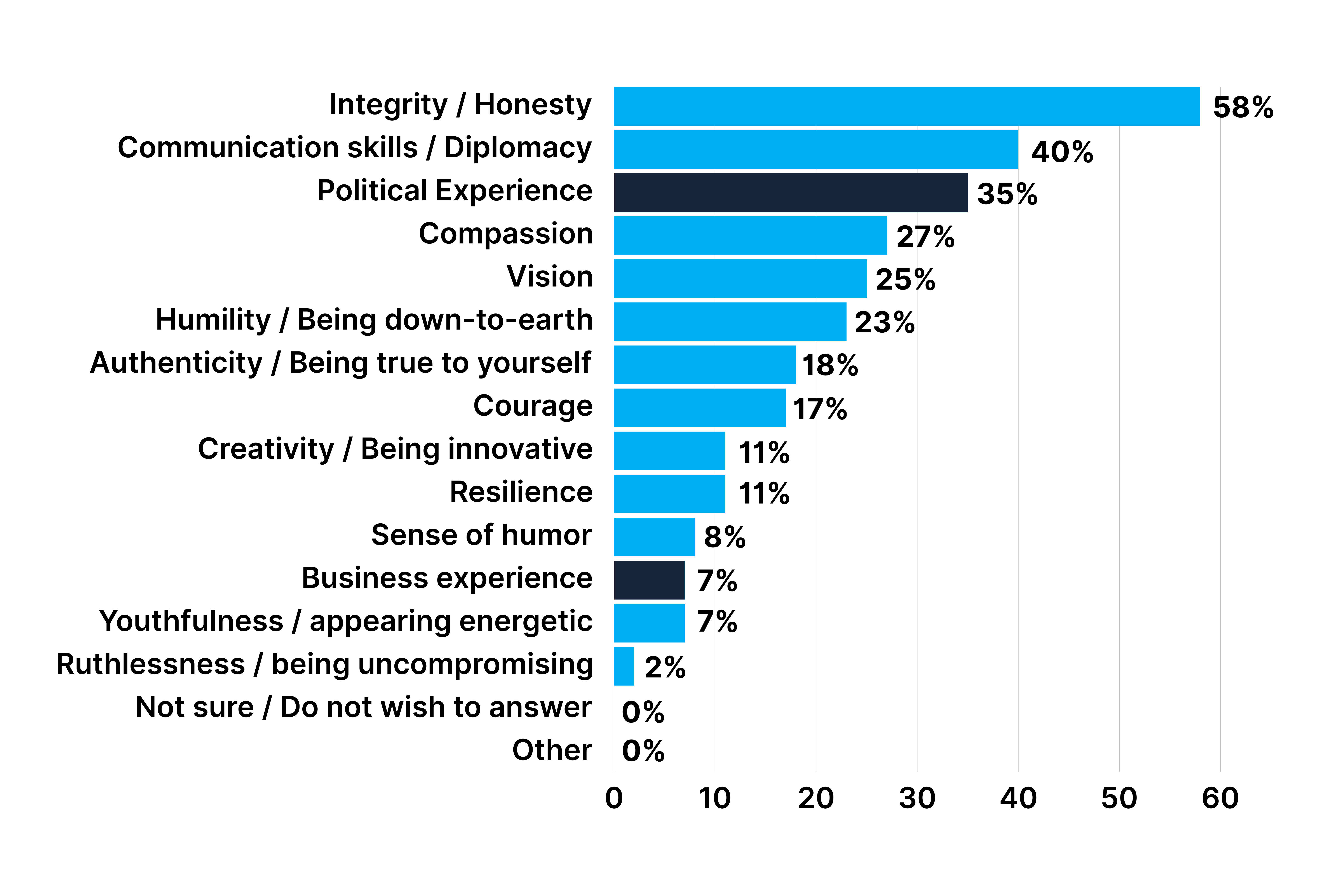
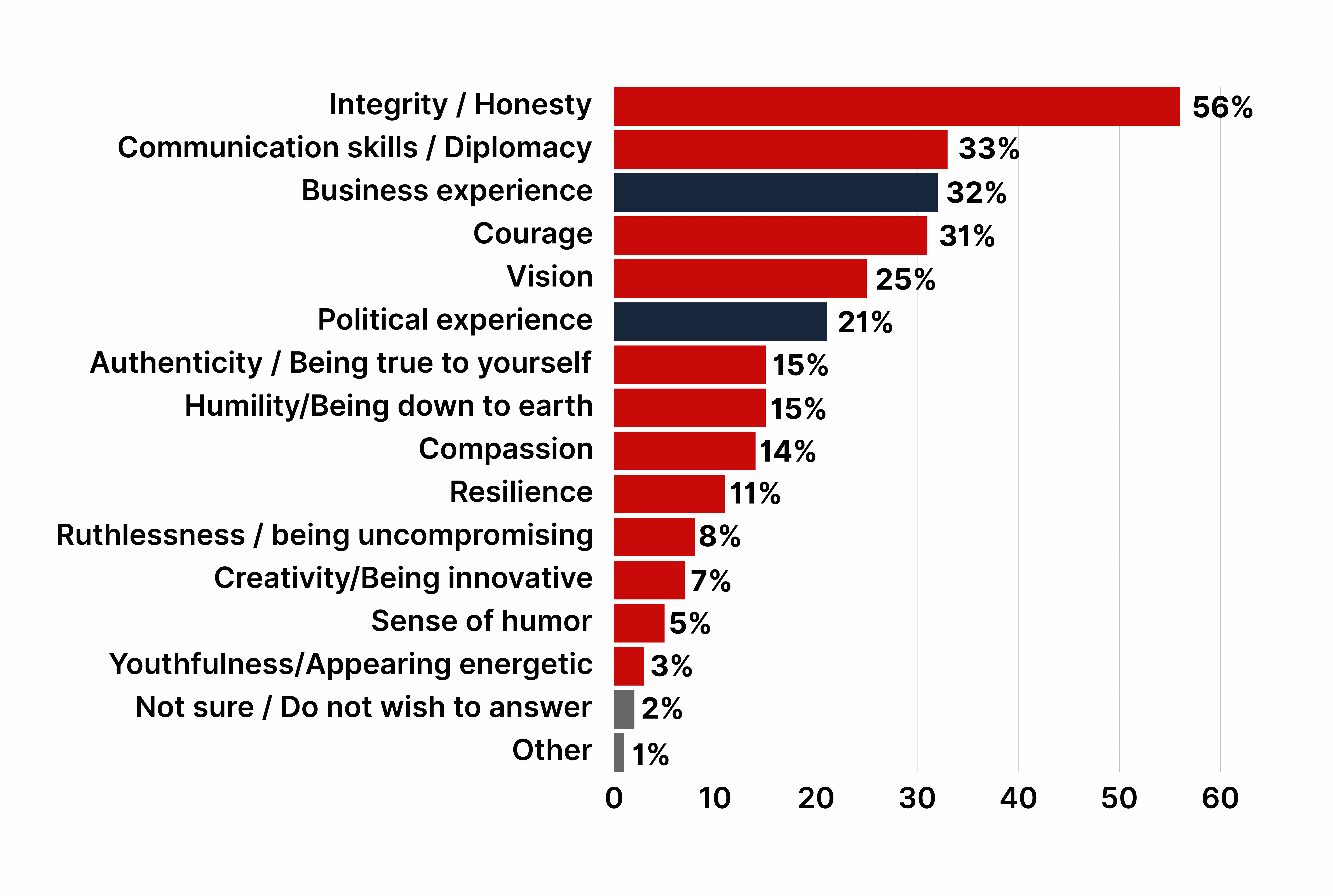
The table shows responses to the question, “Which of the following institutions do you trust the most to tell you the truth?”, among respondents who identify as either Democrats or Republicans.
Despite political differences, integrity and communication skills are universally valued qualities in a president, although Republicans emphasize business experience and courage more than Democrats.
Finally, for fun, we gave respondents a list of potential presidential candidates and asked them to choose three they would vote for.
The data sheds light on public opinion of celebrity candidates (as well as several prominent politicians mooted as potential future candidates).
Kamala Harris leads with 40% of the vote, followed by Donald Trump on 36% and Michelle Obama on 25%. Other figures, such as Dwayne “The Rock” Johnson (9%), Oprah Winfrey (5%) and Tucker Carlson (5%), lag.
Of the 7% of Democrats who would vote for Donald Trump, nearly half (41.7%) said ruthlessness is the most important quality in a president, and Large Corporations are the institutions they most trust to tell the truth (23.1%).
Similarly, 7.7% of Republicans would vote for Kamala Harris, with 25% saying a sense of humor is the most important presidential trait and almost a third (29.4%) picking newspapers as the institution they trust the most.
Though the sample size is low, Democrats who would vote for Trump are more evenly divided between people under and over 35 years old (47 v. 55%) and men and women (56 v. 44%). Republicans who would vote for Harris are predominantly male (72.7%) and over 35 (87.9%).
Celebrity candidates are generally not highly favored, but Dwayne “The Rock” Johnson has the most cross-party appeal, especially among independent voters.
You may also be interested in:




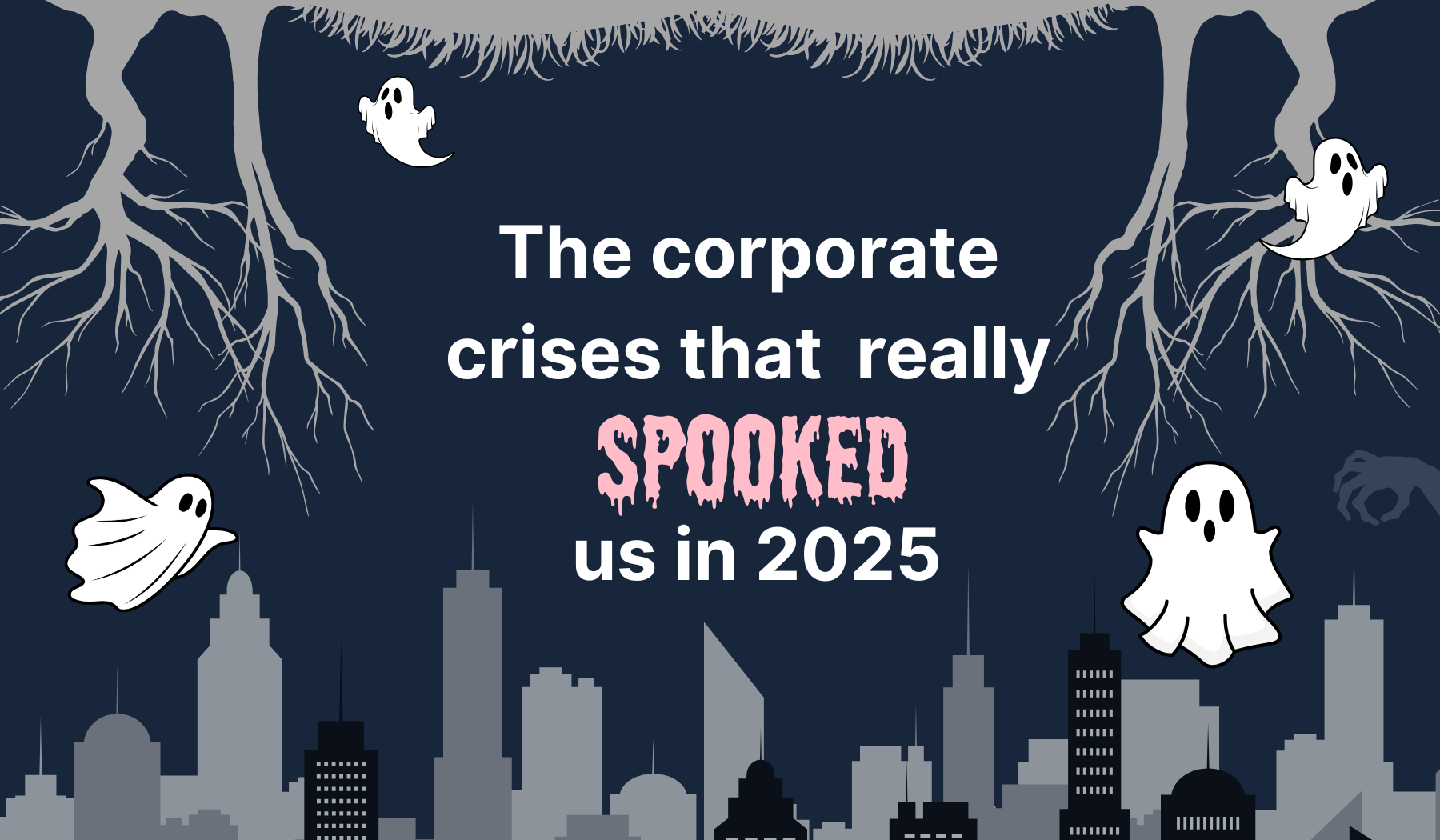

Trust in American Institutions:
An Exclusive Survey

EXECUTIVE SUMMARY
Asked which institutions they trust most to tell the truth, Americans place the highest trust in Churches/organized religion (24%) and Small and medium-sized businesses (SMEs) (21%).
Large corporations (3%) and Big Tech companies (4%) rank among the least trusted institutions. Despite the lack of trust in “big business”, individual corporations can stand out from the crowd and become more trusted among stakeholders — by acting with integrity and operating in a more responsible and trustworthy manner.
Trust in institutions is deeply divided along party lines, with Democrats favoring news outlets and Republicans placing trust in religious institutions and law enforcement. Highly educated Americans trust SMEs, Big Tech, and Large Corporations much more than Americans who only completed some or all of high school.
Democrats prefer presidential candidates with political and legal experience, while Republicans lean toward business leaders and military figures. Political experience is far more important to Democrats (34%) than Republicans (21%), who instead value Business experience (32%).
Celebrity candidates are generally not highly favored, but Dwayne “The Rock” Johnson has the most cross-party appeal, especially among Independents.
“Companies can stand out from the crowd and build trust among stakeholders by operating with more responsibility and integrity.”
Shahar Silbershatz, Caliber CEO
PART 1 - INTRODUCTION
Business is widely believed to be more “trusted” than other storied institutions such as governments or NGOs.
That’s certainly the conclusion of one prominent annual survey, which hogged headlines again this year with its assertion that “respondents in every country except Saudi Arabia and Singapore said that business was both more competent and more ethical than government and media”.
This topic is very much in our wheelhouse. Our mission is to help companies become more trusted by listening to their stakeholders. Our slogan is “Better business through greater trust.”
Along with likeability, the degree to which a company is trusted is one of the core reputational attributes we track and reflect through a Trust & Like Score.
What, though, does it mean to trust an institution? What is a trusted business? The extent to which it’s perceived as “competent” or “ethical” is one way to assess its apparent trustworthiness. Arguably, however, the extent to which people say they trust it — or trust it to tell the truth — is a more convincing, if not credible, lens.
Ahead of what’s shaping up to be another bitterly contested battle for the White House — one in which the candidates’ ability to tell the truth should be germane — we decided to explore Americans’ trust in institutions such as business, government, and the media.
Moreover, with a sometime CEO and self-styled “businessman” seeking reelection against a former prosecutor and Senator, we also surveyed perceptions of the ideal background and qualities of the commander-in-chief — including of actual or hypothetical presidential candidates.
What does our data about trust in institutions show?
First, some businesses are “more trusted” than other institutions, such as the media or government — “small and medium-sized businesses”. Indeed, SMEs — think: mom-and-pop stores, local and regional companies, businesses rooted in their communities — are the second-most trusted institution in America, pipped to the top spot by churches and other religious bodies.
Second, the data disproves the idea that big business is “more trusted” than other institutions such as the media or government.
"The data disproves the idea that big business is “more trusted” than other institutions such as the media or government."
Quite the opposite. Large corporations are the least trusted institution, behind Big Tech and Congress. In other words, the picture is more nuanced than headlines about trust in business would have us believe.
Size, visibility and authenticity may explain this discrepancy. By definition, SMEs have fewer employees than large corporations. They also have fewer offices, a smaller geographic reach, and stronger ties to local communities. SMEs typically have a human face and engage with customers more directly, personally and authentically.
By contrast, large corporations can easily come across as deracinated behemoths spanning countries and continents, located everywhere but nowhere. In popular culture, they are often depicted as pantomime villains — shifty, shady enterprises whose real purpose is always concealed.
Large corporations are also easily associated with entire sectors, and vice versa. This bank is the face of Wall Street. That pharmaceutical giant typifies Big Pharma. By the same token, large corporations are typically viewed as having greater political power and more able than SMEs to lobby for their interests and rest their thumb on the scale.
Little wonder, then, that stakeholders are quick to trust the SME, the multi-generational family-run store doing honest business on the same street corner, but distrust faceless blobs headquartered in Delaware and doing business on every continent.
Trust Matters?
What should we make of all this? Well, it’s bad news for big business, as a whole. But for individual companies, it’s an opportunity to stand out, to be the exception that proves the rule.
People may not trust large corporations per se — but as our historical stakeholder-perception data shows, they do trust many companies individually.
Indeed, a glance at any of our sector reports — and the wide range of Trust & Like Scores that companies routinely get — suggests as much.
We continuously track perceptions of thousands of global corporations — and can see, in real time, vast differences in how stakeholders perceive their brand and reputation.
A closer look at our historical data also reveals what any company must do to become more trusted.
The three biggest drivers of corporate reputation are stakeholder perceptions of a company’s Authenticity, its Relevance, and how much Integrity it has — in other words, whether it’s perceived to behave responsibly.
Indeed, our data shows that a company’s Integrity score is responsible for 13.4% of its overall Trust & Like Score. The upshot?
To become more trusted, a company should operate in a more trustworthy manner. And, as our latest data shows, the bigger the company, the more their work is cut out.
"People may not trust large corporations per se — but as our historical stakeholder-perception data shows, they do trust many companies individually."
Quite the opposite. Large corporations are the least trusted institution, behind Big Tech and Congress. In other words, the picture is more nuanced than headlines about trust in business would have us believe.
Size, visibility and authenticity may explain this discrepancy. By definition, SMEs have fewer employees than large corporations. They also have fewer offices, a smaller geographic reach, and stronger ties to local communities. SMEs typically have a human face and engage with customers more directly, personally and authentically.
By contrast, large corporations can easily come across as deracinated behemoths spanning countries and continents, located everywhere but nowhere. In popular culture, they are often depicted as pantomime villains — shifty, shady enterprises whose real purpose is always concealed.
Large corporations are also easily associated with entire sectors, and vice versa. This bank is the face of Wall Street. That pharmaceutical giant typifies Big Pharma. By the same token, large corporations are typically viewed as having greater political power and more able than SMEs to lobby for their interests and rest their thumb on the scale.
Little wonder, then, that stakeholders are quick to trust the SME, the multi-generational family-run store doing honest business on the same street corner, but distrust faceless blobs headquartered in Delaware and doing business on every continent.
PART TWO - DIVING INTO THE DATA
1. Trust in Institutions: A Divided Nation
When asked which institutions they trust most to tell the truth, Americans place the highest trust in Churches/organized religion (24%) and Small and medium-sized businesses (SMEs) (21%), followed by the Medical system (18%) and the Police (17%).
However, trust in institutions is significantly shaped by political affiliation:
Democrats trust Newspapers (24%), the Medical system (23%), and SMEs (20%) the most. Interestingly, they also exhibit relatively high trust in Television news (19%) and The White House (16%).
Republicans, by contrast, place far greater trust in Churches (38%) and the Police (23%), with SMEs (20%) also ranking highly. Republicans show low trust in Newspapers (8%) and The White House (7%), reflecting a broader skepticism towards mainstream media and political institutions.
There’s also a clear distrust of large corporations and Big Tech. Large corporations (3%) and Big Tech companies (4%) rank among the least trusted institutions, with similar sentiments apparent among people who identify as voters of both main parties.
When combining similar institutions into broader categories (e.g., Newspapers and Television News combined as “News Outlets”), the trust divide becomes even clearer:
Democrats trust News Outlets (34%) and Non-Profit Organizations/Churches (31%) the most, while Republicans primarily trust NPOs/Churches (42%) and Police/Military (36%).
Trust in Political Institutions remains notably low across both groups, with Democrats trusting them more (20.5%) than Republicans (10.3%).
Focus on Education Levels
Our data allows us to compare individuals with high education levels (people continuing education beyond high school) and those with middle/low education levels (high-school graduates and people completing some high-school education, respectively). It reveals some key differences in trust in political institutions and businesses.
Trust in Political Institutions: Consistent Across Education Levels
Interestingly, trust in Political institutions (including the White House and Congress) remains relatively similar between the two education groups:
12% of respondents with a high education level trust political institutions, compared to 14% of the middle/low education group.
This suggests that while education influences trust in other types of institutions, political institutions inspire similar levels of skepticism across the board.
Trust in Business: Higher Among the Highly Educated
A key difference emerges when looking at trust in Business (SMEs, Big Tech, and Large Corporations). Trust in this category is significantly higher among the highly educated:
28% of highly educated respondents trust businesses, compared to only 17% of the middle/low education group.
This gap could reflect the fact that those with higher education levels are often more familiar with and integrated into the business world and may have more favorable views of business institutions. In contrast, those with lower education levels may have less exposure to or positive experiences with corporate environments, leading to lower trust.
SMEs: A Key Difference in Trust
When asked which institutions they trust most to tell the truth, Americans place the highest trust in Churches/organized religion (24%) and Small and medium-sized businesses (SMEs) (21%), followed by the Medical system (18%) and the Police (17%).
💡 Key takeaway
Trust in institutions is deeply divided along party lines, with Democrats favoring news outlets and Republicans placing their trust in religious institutions and law enforcement.
Highly educated Americans trust in Business (SMEs, Big Tech, and Large Corporations) more than others.
2. Ideal Background for the President: Political Experience vs. Business Leadership
Next, we asked Americans about the type of individual best suited to be President of the United States.
Lawyers/judges (29%), Congresspersons (27%), and Soldiers/military leaders (27%) are the top choices, reflecting a strong preference for political and legal experience.
However, political leanings once again influence preferences:
Democrats overwhelmingly favor individuals from political/legal backgrounds, such as Lawyers/judges (43%) and Congresspersons (43%). They also favor Diplomats (32%) and Teachers/professors (26%).
Republicans, on the other hand, prefer leaders from the business world, with CEOs of large corporations (42%) and Entrepreneurs (31%) ranking highly. Republicans also favor Soldiers/military leaders (34%), indicating a strong belief in business acumen and military experience for leadership.
The tables show responses to the question, “Thinking about the most important qualities the President of the United States should possess, what type of individual would be best suited for the presidency?”, among respondents who identify as Democrats.
The tables show responses to the question, “Thinking about the most important qualities the President of the United States should possess, what type of individual would be best suited for the presidency?”, among respondents who identify as Republicans.
When similar professions are grouped, it’s clear that Democrats favor candidates with a Political/legal background (74%), while Republicans prefer those with a Business background (63%).
These preferences reflect broader ideological divides, with Democrats valuing political experience and Republicans emphasizing leadership in business and military service.
Democrats prefer presidential candidates with political and legal experience, while Republicans lean toward business leaders and military figures.
3. Presidential Qualities: Integrity and Communication Skills Top the List
Across the political spectrum, Integrity/honesty (58%) and Communication skills/diplomacy (38%) are considered the most important qualities for a U.S. president.
These qualities are valued far more than traits like Ruthlessness/being uncompromising (5%), Youthfulness/appearing energetic (4%), and even Creativity/being innovative (9%).
Both Democrats (58%) and Republicans (56%) agree that Integrity is the most important quality.
However, Democrats place more emphasis on Communication skills/diplomacy (40%) and Compassion (27%), while Republicans prioritize Courage (31%) and Business experience (32%).
Political experience is far more important to Democrats (34%) than Republicans (21%), who instead value Business experience (32%).
This suggests that while there is common ground on key leadership qualities, there are notable differences in the emphasis on experience, with Democrats focusing on political and diplomatic skills and Republicans valuing business success and strength.
When combining similar institutions into broader categories (e.g., Newspapers and Television News combined as “News Outlets”), the trust divide becomes even clearer:
Democrats trust News Outlets (34%) and Non-Profit Organizations/Churches (31%) the most, while Republicans primarily trust NPOs/Churches (42%) and Police/Military (36%).
Trust in Political Institutions remains notably low across both groups, with Democrats trusting them more (20.5%) than Republicans (10.3%).
💡 Key takeaway
Despite political differences, Integrity and Communication skills are universally valued qualities in a president, although Republicans emphasize Business experience and Courage more.
4. Celebrity Candidates: A Mixed Reception
Finally, for fun, we gave respondents a list of actual and hypothetical, if not future, presidential candidates, and asked them to choose up to three that they would vote for.
The data also sheds light on public opinion regarding celebrity candidates (as well as several prominent politicians mooted as potential future candidates).
Kamala Harris leads with 40% of the vote, followed by Donald Trump at 36%, and Michelle Obama at 25%. Other well-known figures, such as Dwayne “The Rock” Johnson (9%), Oprah Winfrey (5%), and Tucker Carlson (5%), lag.
Among Democrats, Oprah Winfrey (8%) and Dwayne Johnson (7%) are the most popular “celebrity candidates.”
Republicans, on the other hand, prefer Tucker Carlson (10%) and Dwayne Johnson (8%).
Interestingly, Independents and respondents who identify with other parties show relatively strong support for Dwayne Johnson (13%), making him one of the few figures with cross-party appeal.
The tables show responses to the question, “Which of the following individuals would you most likely vote for if they ran for US president?”, among respondents who identify as Democrats, Republicans, independent voters or other.
"People may not trust large corporations per se — but as our historical stakeholder-perception data shows, they do trust many companies individually."
Among the 7% of Democrats who would vote for Donald Trump, nearly half (41.7%) said Ruthlessness is the most important quality for a president, while Large Corporations are the institutions they trust the most to tell them the truth (23.1%).
Similarly, 7.7% of Republicans would vote for Kamala Harris, with 25% saying a Sense of humor is the most important presidential trait and almost a third (29.4%) saying Newspapers are the institutions they trust the most to tell the truth.
And though the sample size is low, Democrats who would vote for Trump are more evenly divided between people under and over 35 years old (47% vs. 55%) and also between men and women (56% vs. 44%). In contrast, Republicans who would vote for Harris are predominantly male (72.7%) and older than 35 (87.9%).
💡 Key takeaway
While celebrity candidates are generally not highly favored, Dwayne “The Rock” Johnson has the most cross-party appeal, especially among Independents.





